Electric Boogaloo: The Wild, Untold Story of Cannon Films (2014)
Written and directed by Mark Hartley.
 Until I popped this DVD into my player, I don’t think I’d ever heard of Cannon Films, although I consider myself a casual fan of Troma Entertainment, the super-low-budget-film company that seems to be Cannon’s kindred spirit.
Until I popped this DVD into my player, I don’t think I’d ever heard of Cannon Films, although I consider myself a casual fan of Troma Entertainment, the super-low-budget-film company that seems to be Cannon’s kindred spirit.
Electric Boogaloo: The Wild, Untold Story of Cannon Films is a documentary about the rise and fall of a movie production company owned by two cousins who just loved to make movies. Gifted salesmen, they made a career-long practice of coming up with a movie title, creating a movie poster, showing the poster to possible investors, and collecting the money for production, often before a script was written or actors cast.
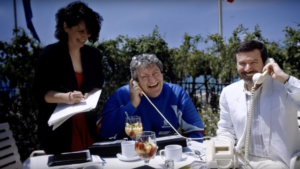 Their figure-it-out-as-we-go approach often meant budgets far lower than expected, story changes in the middle of filming, and bizarre casting decisions. Yet like Troma, Cannon seemed to figure that low budgets meant easier profits, and they could put out a lot of movies in short amounts of time if they didn’t sweat stuff like quality or cohesion. As long as their films had lots of sex, monsters, and explosions, sometimes in the same scene, they knew people would have a good time and come back for the fifth and sixth sequels.
Their figure-it-out-as-we-go approach often meant budgets far lower than expected, story changes in the middle of filming, and bizarre casting decisions. Yet like Troma, Cannon seemed to figure that low budgets meant easier profits, and they could put out a lot of movies in short amounts of time if they didn’t sweat stuff like quality or cohesion. As long as their films had lots of sex, monsters, and explosions, sometimes in the same scene, they knew people would have a good time and come back for the fifth and sixth sequels.
When one of the cousins saw a breakdancer on a Los Angeles sidewalk, he immediately set into motion the production of a movie about breaking. He hired the dancers who would be his stars, hurriedly wrote a story about them, and raced through filming because he heard that another studio was filming Beat Street. For Cannon, it was about getting out there first, not best. Breakin’ and Breakin’ 2: Electric Boogaloo were among Cannon’s first hits, but they were not the last.
 Other well-known hit-or-miss-but-mostly-miss titles the company cranked out are the Happy Hooker and Emmanuelle series, three Death Wish sequels, the American Ninja trilogy, almost every Chuck Norris film including the Missing in Action and Delta Force series, Runaway Train, King Solomon’s Mines, Over the Top, Masters of the Universe, Superman IV: The Quest for Peace, Barfly, Invasion U.S.A., and The Texas Chainsaw Massacre 2. At the same time, it is a hilarious yet impressive filmography. Is there a movie fan older than thirty who hasn’t seen at least a small handful of these pictures?
Other well-known hit-or-miss-but-mostly-miss titles the company cranked out are the Happy Hooker and Emmanuelle series, three Death Wish sequels, the American Ninja trilogy, almost every Chuck Norris film including the Missing in Action and Delta Force series, Runaway Train, King Solomon’s Mines, Over the Top, Masters of the Universe, Superman IV: The Quest for Peace, Barfly, Invasion U.S.A., and The Texas Chainsaw Massacre 2. At the same time, it is a hilarious yet impressive filmography. Is there a movie fan older than thirty who hasn’t seen at least a small handful of these pictures?
Writer-director Mark Hartley interviews nearly thirty actors, producers, and directors about their memories of working for Cannon, including Bo Derek, Sybil Danning, Richard Chamberlain, Dolph Lundgren, Molly Ringwald, Franco Zeffirelli, Cassandra Peterson (Elvira!), Tobe Hooper, Elliot Gould, Robert Forster, and John Avildsen. Some of them have nothing nice to say about their experiences with Cannon, while others wax a bit more nostalgic. The tone is mostly one of amusement, but many contributors admit that there was something valuable about making these films, and something valuable in the films themselves.
 In one segment, the directors talk about how the execs at Cannon promised that they would be allowed to make the movies they wanted, with very little interference from leadership. They don’t seem always to have kept the promise, but you can see why such noted filmmakers as Avildsen, Hooper, Zeffirelli, and John Cassavetes would be willing to work with smaller budgets for a company with Cannon’s checkered past. Zeffirelli says his Otello, a Cannon movie, is the best film of his career.
In one segment, the directors talk about how the execs at Cannon promised that they would be allowed to make the movies they wanted, with very little interference from leadership. They don’t seem always to have kept the promise, but you can see why such noted filmmakers as Avildsen, Hooper, Zeffirelli, and John Cassavetes would be willing to work with smaller budgets for a company with Cannon’s checkered past. Zeffirelli says his Otello, a Cannon movie, is the best film of his career.
Would you rather act in a crappy movie or no movie at all? Would you rather direct one with a small budget but creative control, or one with much more backing but much more oversight? These are identity-defining questions, and if nothing else, Cannon offered actors and directors the choice.
This is a funny documentary and making art is a funny thing. Should lack of talent or resources keep you from the joy of creating? I say no, and if there’s some sincerity in Cannon’s love of making movies, maybe there’s something valuable in the art itself.
I laughed aloud multiple times, and am inspired to check out more of the Cannon team’s work.
8/10
81/100

 Debbie Ocean has had five years (in prison) to plan a heist involving the Met Gala, a $150 million diamond necklace, seven other women of questionable ethics but unquestioned skill, and maybe the guy responsible for her being locked up all those years ago.
Debbie Ocean has had five years (in prison) to plan a heist involving the Met Gala, a $150 million diamond necklace, seven other women of questionable ethics but unquestioned skill, and maybe the guy responsible for her being locked up all those years ago. My biggest problem with the movie is that we don’t really get to know much about the other characters, and since they’re also played by interesting actresses, this is a disappointment. Is it possible to have a good heist movie that also develops its characters well? I wanted to know more about Sarah Paulson’s character especially, but Mindy Kaling’s and Awkwafina’s could also have used some development. I feel mildly ripped off.
My biggest problem with the movie is that we don’t really get to know much about the other characters, and since they’re also played by interesting actresses, this is a disappointment. Is it possible to have a good heist movie that also develops its characters well? I wanted to know more about Sarah Paulson’s character especially, but Mindy Kaling’s and Awkwafina’s could also have used some development. I feel mildly ripped off. We should celebrate also that two of Debbie’s eight accomplices are Asian, and there is no affirmative action in effect here: Mindy Kaling and Awkwafina have already proven their talent, so no excuses need to be made by anyone. If anything, perhaps a few apologies should be sent their way for taking so dang long.
We should celebrate also that two of Debbie’s eight accomplices are Asian, and there is no affirmative action in effect here: Mindy Kaling and Awkwafina have already proven their talent, so no excuses need to be made by anyone. If anything, perhaps a few apologies should be sent their way for taking so dang long.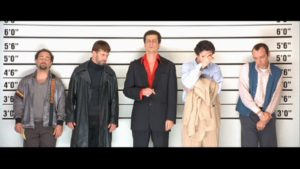 A friend gave me a terrific day-by-day movie quotes calendar, one of the rare such calendars that you don’t fall behind on, because you really can’t wait to see what the next cool quote is going to be, unlike those word-of-the-day calendars which you always lose interest in because you can’t remember yesterday’s word so what’s the point in looking forward to tomorrow’s, or tearing off the last six weeks’ worth of days just to find out what today’s is?
A friend gave me a terrific day-by-day movie quotes calendar, one of the rare such calendars that you don’t fall behind on, because you really can’t wait to see what the next cool quote is going to be, unlike those word-of-the-day calendars which you always lose interest in because you can’t remember yesterday’s word so what’s the point in looking forward to tomorrow’s, or tearing off the last six weeks’ worth of days just to find out what today’s is?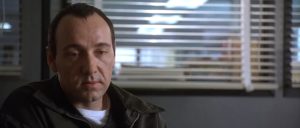 Yeesh. You’d think I’d said I hadn’t seen The Sound of Music (which I haven’t). My friends seemed genuinely concerned. “You must see it!” many commented. Since I work on a university campus and have borrowing privileges, I borrowed the DVD that very afternoon and told everyone to cool it. I was finally going to see it.
Yeesh. You’d think I’d said I hadn’t seen The Sound of Music (which I haven’t). My friends seemed genuinely concerned. “You must see it!” many commented. Since I work on a university campus and have borrowing privileges, I borrowed the DVD that very afternoon and told everyone to cool it. I was finally going to see it.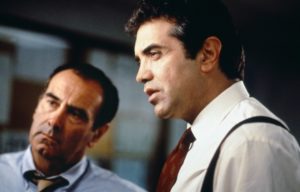 The characters are well-imagined and the dialogue is really great. Kevin Spacey provides some lovely voice-over narration reminding you that the joys of a good noir don’t always emerge from the plot. Very often, it’s the look and feel, the sound of the language, the feel of the shadows, the often unspoken emotions and unmentioned sexual tension that makes you stick with The Big Sleep even though you’ve watched it once a year since you were fourteen and still don’t know what the story’s about.
The characters are well-imagined and the dialogue is really great. Kevin Spacey provides some lovely voice-over narration reminding you that the joys of a good noir don’t always emerge from the plot. Very often, it’s the look and feel, the sound of the language, the feel of the shadows, the often unspoken emotions and unmentioned sexual tension that makes you stick with The Big Sleep even though you’ve watched it once a year since you were fourteen and still don’t know what the story’s about.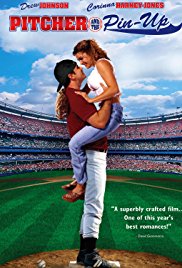 Twelve minutes into The Pitcher and the Pin-Up (originally released as The Road Home), I said on social media, “This may be the worst movie I’ve ever seen.”
Twelve minutes into The Pitcher and the Pin-Up (originally released as The Road Home), I said on social media, “This may be the worst movie I’ve ever seen.”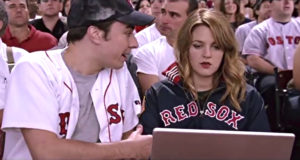 It’s frustrating when a movie has the right pieces, a good concept, well-imagined characters, and a lazy script. Bill Simmons, perhaps America’s most famous Red Sox fan, has famously said he hates Fever Pitch because Ben, the main character played by Jimmy Fallon, does something near the end that no Red Sox fan would ever do.
It’s frustrating when a movie has the right pieces, a good concept, well-imagined characters, and a lazy script. Bill Simmons, perhaps America’s most famous Red Sox fan, has famously said he hates Fever Pitch because Ben, the main character played by Jimmy Fallon, does something near the end that no Red Sox fan would ever do. I’ll see Simmons’s insistance and raise him one more: not only is this not a baseball movie, but neither is it a romantic comedy. Oh, it wants to be a romantic comedy, but Ben’s transformation is so lazily handled that it’s more magic than romance. It tries to be a romantic comedy, but it avoids the messiness of two people working through something real and complicated, leaving us instead with an eye-opening moment for Lindsey, the main character played by Drew Barrymore.
I’ll see Simmons’s insistance and raise him one more: not only is this not a baseball movie, but neither is it a romantic comedy. Oh, it wants to be a romantic comedy, but Ben’s transformation is so lazily handled that it’s more magic than romance. It tries to be a romantic comedy, but it avoids the messiness of two people working through something real and complicated, leaving us instead with an eye-opening moment for Lindsey, the main character played by Drew Barrymore. “You have always loved the Red Sox,” says one character to Ben, “but have the Red Sox ever loved you back?” It’s wisdom, but it’s not the kind of wisdom that should open up the clouds so sunbeams can fall only on Ben, because we’ve already seen what Ben gets out of his fandom: some really good stuff, stuff that Lindsey knows is important.
“You have always loved the Red Sox,” says one character to Ben, “but have the Red Sox ever loved you back?” It’s wisdom, but it’s not the kind of wisdom that should open up the clouds so sunbeams can fall only on Ben, because we’ve already seen what Ben gets out of his fandom: some really good stuff, stuff that Lindsey knows is important.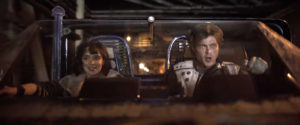 It’s another standalone Star Wars story, and after Rogue One I have to say I was amped to see it. Alden Ehrenreich is a terrific actor, and his “Would that it were so simple” dialogue with Ralph Fiennes in Hail, Caesar! is one of the most laugh-aloud funny scenes I’ve seen in years, so nobody needed to persuade me to buy him as Solo. I was already bought.
It’s another standalone Star Wars story, and after Rogue One I have to say I was amped to see it. Alden Ehrenreich is a terrific actor, and his “Would that it were so simple” dialogue with Ralph Fiennes in Hail, Caesar! is one of the most laugh-aloud funny scenes I’ve seen in years, so nobody needed to persuade me to buy him as Solo. I was already bought. Solo: A Star Wars Story traces Han Solo’s early life, beginning with an escape from some kind of child labor camp (or something!) and ending somewhere vaguely familiar but nonspecific in our knowledge of the Star Wars universe. As it unfolds, we see the development of Han’s story in the years before we meet him in Episode IV.
Solo: A Star Wars Story traces Han Solo’s early life, beginning with an escape from some kind of child labor camp (or something!) and ending somewhere vaguely familiar but nonspecific in our knowledge of the Star Wars universe. As it unfolds, we see the development of Han’s story in the years before we meet him in Episode IV. It’s a standalone movie, but of course it’s a standalone movie about a beloved character. The writers, actors, and director have to walk a delicate line between just telling a good story and being true to both canon and spirit, and they walk it well. Although some of my female friends disagree, Ehrenreich has the swagger and cunning of the Han Solo we know. If he’s not as ruggedly handsome or seductive, he shows signs of becoming that guy. We should expect him to be a bit raw and even innocent, two words we’d never use in describing the character as played by Harrison Ford. Young Han Solo has seen things, but not that many things.
It’s a standalone movie, but of course it’s a standalone movie about a beloved character. The writers, actors, and director have to walk a delicate line between just telling a good story and being true to both canon and spirit, and they walk it well. Although some of my female friends disagree, Ehrenreich has the swagger and cunning of the Han Solo we know. If he’s not as ruggedly handsome or seductive, he shows signs of becoming that guy. We should expect him to be a bit raw and even innocent, two words we’d never use in describing the character as played by Harrison Ford. Young Han Solo has seen things, but not that many things.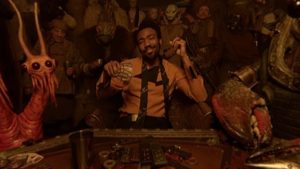 The other major, less doubtful question is whether Donald Glover could pull off Lando Calrissian. I feel very confident in assessing his performance as better than anyone could have hoped. He’s not only perfect, he’s somehow better than that, so charismatic, morally ambiguous, and charming that he almost steals the movie from Ehrenreich.
The other major, less doubtful question is whether Donald Glover could pull off Lando Calrissian. I feel very confident in assessing his performance as better than anyone could have hoped. He’s not only perfect, he’s somehow better than that, so charismatic, morally ambiguous, and charming that he almost steals the movie from Ehrenreich. The problem with an unexpectedly good movie like Deadpool is that it creates fair but lofty kinds of expectation for its sequel. The first Ice Age and Shrek films did the same thing, and their follow-ups suffered for it.
The problem with an unexpectedly good movie like Deadpool is that it creates fair but lofty kinds of expectation for its sequel. The first Ice Age and Shrek films did the same thing, and their follow-ups suffered for it.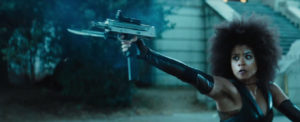 It isn’t that Deadpool 2 is bad. It’s just positioned to deliver more of the same: more cleverness, more irreverence, more vulgarity, more compassion for its main character, and more unexpectedness. Either that or it might have found new ways to be equally all these things. It’s too much to ask, and this sequel isn’t up to it.
It isn’t that Deadpool 2 is bad. It’s just positioned to deliver more of the same: more cleverness, more irreverence, more vulgarity, more compassion for its main character, and more unexpectedness. Either that or it might have found new ways to be equally all these things. It’s too much to ask, and this sequel isn’t up to it. Even the structure of the film is pretty much the same. This is no origin story, but the movie opens in medias res, then flashes back, works its way forward and continues to the end. I guess if a thing works, you just do it again.
Even the structure of the film is pretty much the same. This is no origin story, but the movie opens in medias res, then flashes back, works its way forward and continues to the end. I guess if a thing works, you just do it again.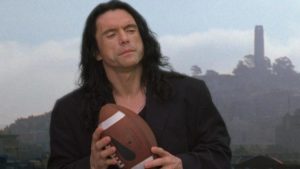 Apparently, sometime in the past fifteen years without anyone’s consulting me, 2003’s The Room supplanted Plan 9 from Outer Space as the worst movie ever made. I didn’t even know this film existed until I saw the hype leading up to the release of James Franco’s 2017 The Disaster Artist.
Apparently, sometime in the past fifteen years without anyone’s consulting me, 2003’s The Room supplanted Plan 9 from Outer Space as the worst movie ever made. I didn’t even know this film existed until I saw the hype leading up to the release of James Franco’s 2017 The Disaster Artist.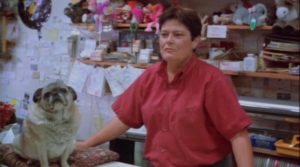
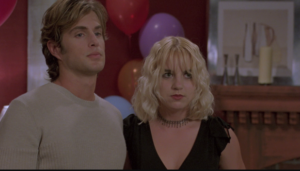 And yeah. The whole movie is pretty much just like that.
And yeah. The whole movie is pretty much just like that. I’ve seen the film three times. Each time it was more charming and more watchable than the previous, but seriously, I can’t just sit and watch it all the way through. I can have it on while I get some work done, while I make dinner, or while I’m goofing off online. It continues to be a horrible, terrible movie with only two things to recommend it on its own merit (and without irony).
I’ve seen the film three times. Each time it was more charming and more watchable than the previous, but seriously, I can’t just sit and watch it all the way through. I can have it on while I get some work done, while I make dinner, or while I’m goofing off online. It continues to be a horrible, terrible movie with only two things to recommend it on its own merit (and without irony). Sometimes a movie must be reviewed for how it addresses big, important issues, and the more the reviewer knows about these issues, the more credible the review.
Sometimes a movie must be reviewed for how it addresses big, important issues, and the more the reviewer knows about these issues, the more credible the review. So this is how a middle-aged, never-married-never-had-kids man, knowing full well he will never relate to a huge chunk of the art’s purpose, receives Tully, a movie about a middle-aged woman dealing with post-childbirth life as a mother and wife.
So this is how a middle-aged, never-married-never-had-kids man, knowing full well he will never relate to a huge chunk of the art’s purpose, receives Tully, a movie about a middle-aged woman dealing with post-childbirth life as a mother and wife. Tully’s job is to take care of Marlo’s newborn at night, waking Marlo for feedings but otherwise leaving her to sleep while Tully takes care of changing the baby, cleaning up after the baby, and rocking the baby to sleep. The extra rest does wonders for Marlo, who suddenly has time and energy to do many of the good-mommy things she feels she’s neglected lately, like preparing family meals that don’t come out of the freezer.
Tully’s job is to take care of Marlo’s newborn at night, waking Marlo for feedings but otherwise leaving her to sleep while Tully takes care of changing the baby, cleaning up after the baby, and rocking the baby to sleep. The extra rest does wonders for Marlo, who suddenly has time and energy to do many of the good-mommy things she feels she’s neglected lately, like preparing family meals that don’t come out of the freezer.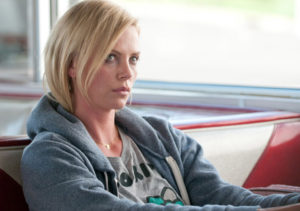 Marlo needs rest and time, but she also needs help, and she needs to be healthy in mind and body. Tully makes it all possible, and Marlo’s reemergence is lovely to see.
Marlo needs rest and time, but she also needs help, and she needs to be healthy in mind and body. Tully makes it all possible, and Marlo’s reemergence is lovely to see.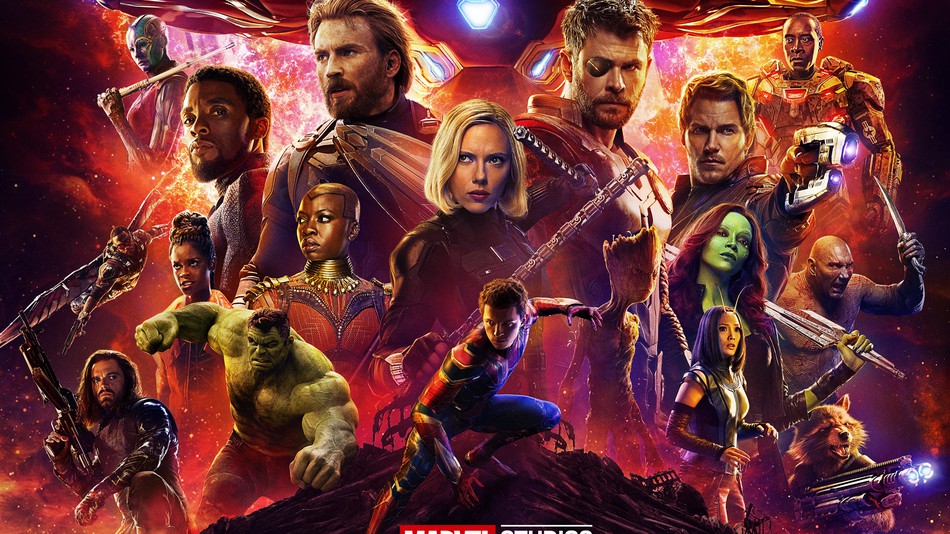

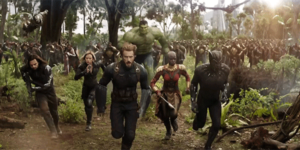
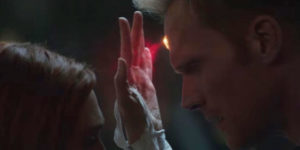 It’s a huge, far-flung plot involving a ridiculous number of important, charismatic characters with really only one villain, and it mostly works. It’s difficult to point to any one character and say, “That one didn’t get his or her fair share of screen time,” although at least three heroes are noticeably absent. I’m partial to Scarlet Witch and would have liked more of her, but everyone pretty much gets a nice, important part to play.
It’s a huge, far-flung plot involving a ridiculous number of important, charismatic characters with really only one villain, and it mostly works. It’s difficult to point to any one character and say, “That one didn’t get his or her fair share of screen time,” although at least three heroes are noticeably absent. I’m partial to Scarlet Witch and would have liked more of her, but everyone pretty much gets a nice, important part to play.